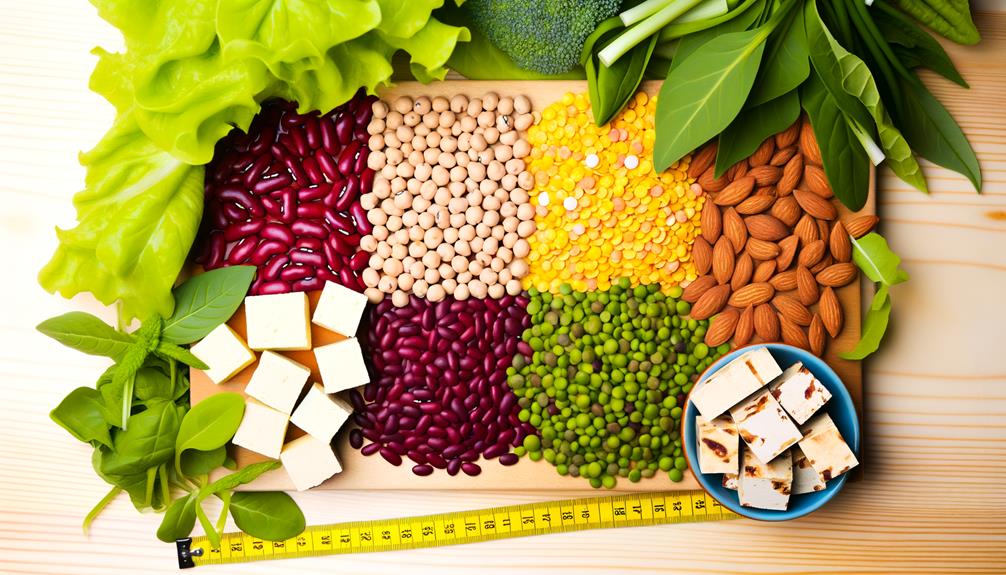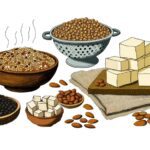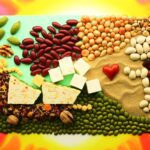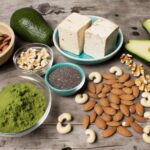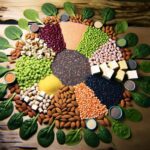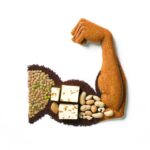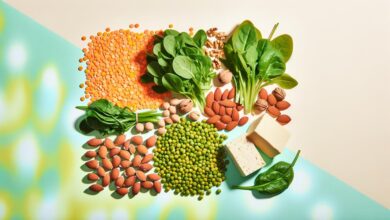Nearly 6% of U.S. consumers are now considering themselves vegan, a lifestyle choice that’s led you, like many others, to explore the diverse world of plant-based nutrition. As you seek out low-fat vegan protein options, you’re not just following a trend; you’re part of a cultural shift towards sustainable and compassionate eating habits. You may already know that staples like tofu, lentils, and beans are go-to sources, but the spectrum of plant-based proteins extends beyond these familiar favorites. They offer not just the essential amino acids your body needs but also a canvas for culinary creativity. What you might not yet realize is how these proteins can seamlessly fit into your existing meals, enhancing flavors without compromising on health. Stick around to uncover the underrated plant proteins that could revolutionize your plate and satisfy your nutritional needs without the excess fat.
Key Takeaways
- Lentils, chickpeas, black beans, quinoa, and tofu are excellent low-fat vegan protein sources.
- Nuts, seeds, and plant-based protein powders like hemp, chia, and pea can also provide a good amount of protein.
- There is no need to combine different plants at each meal to get all the essential amino acids as long as there is a variety of pulses, nuts, seeds, and vegetables in the diet.
- It is important to be mindful of meeting protein needs, which can be achieved through supplementation or mindful meal planning while honoring commitments to others and the planet.
Essential Vegan Protein Basics
Understanding the basics of vegan protein is key to ensuring your plant-based diet is nutritionally balanced and supports your body’s needs. Diving into the realm of legumes, you’ll find lentils, chickpeas, and black beans as staples in your quest for getting enough protein. These beans aren’t just versatile culinary delights; they’re packed with grams of protein per serving that rival their animal-based counterparts.
Nuts and seeds, including almonds, chia seeds, and hemp seeds, offer more than just crunch and flavor. They’re a treasure trove of essential amino acids, making them nearly equivalent to a complete protein source. When you blend compassion with nutrition, you serve not only your body but the greater good.
Tofu and tempeh stand out in the vegan diet, providing that satisfying texture and protein punch. Vegetables, often underestimated, bring their own protein powerhouses to the table. Spinach, broccoli, and Brussels sprouts contain significant amounts, defying the myth that greens lack substance.
For those on the go, vegan protein powders derived from peas, rice, and hemp offer a convenient boost to your protein intake. Easily mixed into smoothies or baked goods, they ensure you’re fueled and ready to serve both your personal well-being and the community.
Top Low-Fat Protein Foods
While exploring the rich variety of vegan protein sources, it’s vital to highlight the top low-fat foods that can effortlessly fit into your daily meals. These plant-based proteins not only support a compassionate lifestyle but also contribute to a well-balanced vegan diet.
Quinoa is one of the best vegan proteins available, doubling as a grain that complements any dish while packing a complete protein punch. Buckwheat, another seed, offers a robust protein content without the added fat, making it a go-to for your protein intake. When we talk about plant-based foods, pulses like beans and rice often come to mind. These staples are not only culturally significant but are also prized for their high-protein foods status while being naturally low in fat.
Tofu, a beloved vegan ingredient, is incredibly adaptable to numerous recipes. And let’s not forget about the small but mighty nuts and seeds. A sprinkle of hemp seeds or chia can effortlessly boost your protein without piling on the fat.
Here’s a quick reference to help you serve up these nutritious choices:
| Food | Protein per 100g |
|---|---|
| Quinoa | 4g |
| Pulses | 7-10g |
| Tofu | 8g |
| Nuts & Seeds | Varies |
| Buckwheat | 5g |
Embrace these low-fat, high-quality vegan protein sources to enrich your dishes and nourish those you care for.
Plant-Powered Muscle Builders
Fuel your muscles with the power of plants by choosing from a diverse array of low-fat, vegan proteins that are perfect for building strength and aiding recovery. Embrace foods like quinoa, pulses, and tofu, which are not only great sources of protein but also rich in the necessary amino acids your body craves. Quinoa stands out as one of the few plant-based sources considered complete proteins, containing all nine essential amino acids.
As you serve your body, remember that chia seeds and various nuts are also fantastic sources of plant protein, supporting your mission to maintain a robust and healthy physique. These best plant-based builders go beyond mere muscle repair; they’re imbued with vital nutrients that help you thrive in your daily endeavors to assist others.
While you’re nurturing your strength with these vegan options, keep in mind the importance of rounding out your diet with nutrients like vitamin B12, iron, and omega-3s. These elements are crucial for peak performance and can be easily incorporated with mindful meal planning or supplementation. Let these plant-powered muscle builders be the cornerstone of a diet that’s as compassionate as it is strong, fueling not just your body, but your commitment to a life of service.
Vegan Protein Meal Ideas
How can you turn quinoa, pulses, tofu, nuts, and seeds into delicious and nutritious vegan meals that pack a protein punch? By exploring the rich variety of vegan sources, you’re not just nourishing yourself, but also serving the planet and its inhabitants with kindness.
Here are three meal ideas to keep you inspired:
- Quinoa Stuffed Peppers: Mix cooked quinoa with black beans, corn, and spices, then stuff into bell peppers and bake. Quinoa is one of the few plant proteins that’s a complete source, offering all essential amino acids your body needs.
- Tofu Scramble with Spinach: Crumble firm tofu and sauté with turmeric, nutritional yeast, and fresh spinach. Tofu, a top vegan staple, seamlessly absorbs flavors, making your scramble a high-protein diet delight.
- Chickpea Salad Sandwich: Mash chickpeas and mix with celery, vegan mayo, and a dash of lemon juice. Spread onto whole grain bread with lettuce. Pulses like chickpeas are versatile vegan foods, rich in protein and fiber.
Incorporating these plant foods into your routine is effortless. Pair rice and beans for a classic protein duo, whip up some nut butters for a quick snack, and always remember, when you follow a plant-based diet, you’re choosing a path of compassion and health.
As you embrace these plant-based proteins in your meals, let’s also clear up some common misconceptions about protein in a vegan diet. Often, there’s a belief that vegan protein options can’t provide all the essential amino acids your body needs. Yet, nature offers a bounty of complete proteins, such as quinoa and soy products, which stand tall as robust sources of nutrition.
You’ve likely heard that you must combine different plants at each meal to get adequate protein. While it’s true that some plant-based sources, like legumes and whole grains, are richer in certain amino acids than others, it’s not necessary to stress about pairing them at every sitting. Your body is intelligent, pooling amino acids throughout the day to fashion complete proteins.
Moreover, there’s a myth that achieving a sufficient protein intake on a vegan diet is complex. However, with a variety of pulses, nuts, seeds, and vegetables, you’re well-equipped to meet or even exceed your needs, especially when you’re aware of the 0.75g per kg guideline for daily protein consumption. Remember, a mindful approach to your plant-based journey ensures you’re nurturing your body while honoring your commitment to serve others and our planet.
Frequently Asked Questions
How Can Vegans Get More Protein Without Fat?
You’re seeking more protein—try quinoa dishes, tofu’s versatility, and edamame snacks. Blend plant-based powders like pea protein into your diet, sprinkle nutritional yeast, and experiment with seitan recipes for wholesome nourishment.
Which Vegan Protein Is Best for Weight Loss?
You’ll find plant-based thermogenics, like protein-rich legumes, exceptional for weight loss. They enhance metabolic boosters, suppress appetite, and promote satiety with low caloric density, ensuring nutritional balance and optimizing protein synthesis for higher energy expenditure.
What Vegan Option Has the Most Protein?
You’re seeking the protein heavyweight? Look at tempeh and lentil varieties. Tofu options and seitan choices abound, but quinoa benefits muscle-building, too. Don’t overlook hemp seeds, algal protein, spirulina boost, or pea concentrate.
What Is the Most Efficient Source of Protein for Vegans?
You are what you eat, so choose wisely. Plant-based diets thrive on protein-rich legumes, tofu’s versatility, and seitan’s benefits. Hemp seeds, nutritional yeast, and soy alternatives offer complete amino acids for muscle building and optimal protein absorption.
